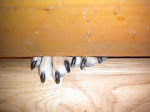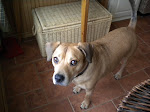PAW's bylaws allow any volunteer in good standing to appeal to the board, which I did in writing. My goal was to discuss PAW's association with its main vet and to question why this practice is virtually the only one used by PAW. I had gathered some information on other area vets offering the same services and discounts and wanted to discuss the potential benefits of enlisting more of these vets' help. I wanted to also discuss the manner in which my pet's treatment was handled and the way I was treated by PAW's vet as I felt it was relevant. I had written proof to present to the board, which I wanted looked at and discussed openly. I wanted the PAW board to address this vet's treatment of the homeless dogs in its care. At the insistance of PAW's vet, these dogs were deprived of walks and socialization offered by four PAW volunteers, and I felt it was appropriate for the board of directors to discuss this incident. In addition, I wanted to discuss another incident, in which PAW's vet ordered two young cats abandoned at his doorstep in August of 2008 picked up by Prince George's animal control (a high-kill facility) before any other opportunity could be explored. I believed (and still do) that this vet's philosophy was not consistent with the philosophy of rescue and that pouring tens of thousand of dollars of donors tax-free contributions (without these donors' being informed of the truth) was inappropriate. I believed that this matter was important enough to warrant an open discussion. Several other PAW volunteers aware of the situation believed so too.
Well, the discussion was not allowed. I was not allowed to come to the meeting at which it took place. My suggestion that a separate meeting be held either in person, over the phone, or e-mail was not addressed. The documentation I had to present in support of my position was not considered (I was not even allowed to submit it). The meeting was held behind closed doors on September 14 2008 and I was not notified of what the discussion entailed. I asked Amy Bleich, the dog coordinator, what happened during the discussion. In an
e-mail she said I should wait until the minutes of the meeting come out (hah?). I asked Ms. Bleich why she couldn't tell me what the decision was, but she wouldn't. I then e-mailed the PAW secretary, Vicky Balenger (the very same who attempted to deny Clooney's adoption--PAW's board positions are often rotated within the inner circle). Vicky said she didn't have an approveed copy of the minutes and it probably wouldn't be available until the next meeting (six months later!). I then said that I would like to see the minutes sooner than the next scheduled meeting, and Ms. Balenger grudgingly produced them attatched to an e-mail in which she expressed a hope that my "bullying behavior would now cease," for which she later apologized (probably under pressure from someone else).
The minutes had all of two lines of text devoted to the issue I had raised: no reduction of the business supplied to the vet because the board would not "take sides" in my dispute with the vet. The minutes contained no details on the discussion, the reasons for my request, or the reasons for denying it. I e-mailed the board members explaining that I had not asked them to "take sides" but rather wanted them to discuss the merits of continuing PAW's close association with this business in light of not only my personal exprience with it but of the questionable treatment by the business owner of the homeless animals PAW is supposed to protect. No answer. No phone calls, e-mails, or disussions. Sticking the head in the sand seemed to be the preferred course of action. After several
e-mails from other PAW volunteers who saw this situation as troubling, Amy Bleich offered a polite (at first) e-mail brush-off. In it she explained that when it comes to the vet's treatment of homeless animals "compassion is a bonus" but not a must for receiving PAW's business. When I questioned the vet's treatment of PAW's homeless dogs deprived of their walks, Ms. Bleich stated that the vet "had his side of the story." No discussion of the vet's side of the story (or mine) to attempt to reveal the truth was allowed. Ms. Bleich also stated to me that it was not "cut and dried" whether my pet's heart condition was even missed on an X-ray. My suggestion we discuss the proof I had of the facts was ignored. The rest of the PAW board was copied on our communication with Ms. Bleich. Not one person had anything to say. Not one person responded to any of our requests to adress the issues substantively. An
e-mail from a PAW volunteer with a medical background was ignored entirely (even by Ms. Bleich). All evidence of distress at the avoidance of the issues was ignored. All attempts to resolve the problem in an open and fair manner were quashed.
PAW's leadership answered one letter, however. It was from a local activist named Stefani, who is very vocal in promoting veterinary safety and runs several web sites. That got their attention pronto! Stefani was never a PAW volunteer, but unlike all the volunteers (some long-time) who never heard from the board in response to their e-mails,
her e-mail was answered very quickly. The letter, as Stefani described it, "voiciferously defended the vet." In addition, Ms. Bleich (surpise!) sent a separate e-mail to Stefani, offering to meet in person to discuss how much PAW's vet does for rescue. One has to wonder what was so secret about PAW's vet's distinctions that they had to be discussed in person and off the record.





